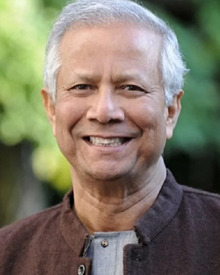Muhammad Yunus

Dr Muhammad Yunus, awarded the Nobel Peace Prize in 2006, is the founder of Bangladesh’s Grameen Bank. Set up in 1983, its aim was to enable the poor to break out of poverty by providing them credit.
Dr Yunus began his life’s work by doling out small loans to basketweavers in the 1970s. Today, the Grameen Bank is in the vanguard of a global movement using microfinance as a tool to eliminate poverty. The Grameen Bank model exists in more than 100 countries.
Dr Yunus was born in 1940 in Chittagong. After studying at Dhaka University, he secured a Fulbright scholarship to study economics at Vanderbilt University. He got a Ph.D. from Vanderbilt in 1969 and the next year started teaching at Middle Tennessee State University. He then returned to Bangladesh, where he was head of the economics department at Chittagong University.
In 1993 Dr Yunus was appointed by the UN secretary general as a member of the International Advisory Group for the Fourth World Conference on Women. He held the post until 1995. He has also been part of the Global Commission of Women’s Health, the Advisory Council for Sustainable Economic Development and the UN Expert Group on Women and Finance.
Among the many awards conferred on Dr Yunus are the Mohamed Shabdeen Award for Science (1993), Sri Lanka; Humanitarian Award (1993), CARE, USA; World Food Prize (1994), World Food Prize Foundation, USA; lndependence Day Award (1987), Bangladesh’s highest award; King Hussein Humanitarian Leadership Award (2000), King Hussein Foundation, Jordan; Volvo Environment Prize (2003), Volvo Environment Prize Foundation, Sweden; Nikkei Asia Prize for Regional Growth (2004), Nihon Keizai Shimbun, Japan; Franklin D. Roosevelt Freedom Award (2006), Roosevelt Institute of The Netherlands; and the Seoul Peace Prize (2006), Seoul Peace Prize Cultural Foundation, Seoul, South Korea.